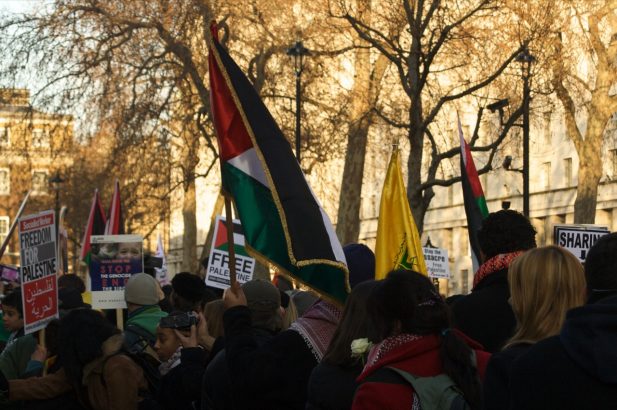In this timely and eloquent essay, Jamie Palmer explores the impact on the politics of the Left of desperately simplistic narratives of the Israeli-Palestinian conflict that have been designed to protect the Palestinian’s preordained status as wholly blameless victims, lacking either political agency or moral responsibility. Over the years, he argues, as the explanatory limitations of these narratives have encountered unfolding complexities on the ground – Arab terrorism, Palestinian maximalism and rejectionism, the suicide bombers of the Second Intifada, the rise of Islamist violence, popular eliminationist antisemitism – they have only produced new crises of understanding, and a requirement for ever more conspiratorial explanations of Israeli behaviour. Tendentious and conspiratorial anti-Zionist analyses have rushed into the vacuum of understanding, and have been absorbed by ever-larger sections of the Left. The wilful selectivity of an analysis that allows for no credit in the Israeli column, nor any debit in the Palestinian column, has produced a distorted view of the conflict, as tragic as it is unnecessary.
At the start of last year I wrote a column for Quillette about accusations of ‘pinkwashing’ made against the State of Israel and her supporters. This charge holds that (a) Israel uses a progressive record on gay rights as a means of distracting world attention from its treatment of Palestinians and (b) any attempt to universalise Western LGBT norms is a form of cultural imperialism intended to stigmatise Arab countries as backward and barbaric. It struck me as particularly odd that arguments like these were being made by left-wing activists and academics, many of whom self-identify as ‘queer’. Why would people ostensibly devoted to gay rights advocacy defend a lamentable record on LGBT issues and denounce a laudable one?
Among Palestine’s progressive supporters, I theorised, we are seeing a manifestation of the same perverse phenomenon George Orwell had observed among Western Stalinists at the end of the Second World War. Communism was believed by its adherents to be a more ethical and just system than capitalism and nothing Communist states actually did would be allowed to capsize this foundational moral judgement – not the gulags, not the famines, not the purges, not the pitiless persecution of free-thinkers and dissidents, and not the imperial subjugation of satellite states and their wretched populations. The failings and imperfections of the West’s liberal democracies, meanwhile, would be pored over at length, paradoxically aided by a free press and culture of self-criticism, the absence of which stymied open discussion in the Communist bloc.
Palestinians today are similarly ennobled, not by their doctrine, but by statelessness and oppression, and mere details cannot be allowed to complicate the monochromatic liberation narrative of large parts of the Left. If Palestinians persecute and jail their own LGBT citizens, well that’s their business and who are we to judge their cultural mores, anyway? And if the Israelis hold a gay pride march in Tel Aviv, then this ostentatious display of tolerance must be a cynical attempt to conceal a more authentic cruelty and racism. In this way, progressive Western advocates for Palestine rationalise their non-negotiable support for a nationalist movement, the moral and political values of which are often so completely at variance with their own.
The column drew a predictably unsympathetic response from pro-Palestinian readers. But objections were also made by a number of Israel’s defenders. This was all very well, they said, but I had got the matter back to front. They pointed out that these activists show precious little interest when Palestinians suffer at the hands of other Arabs. If it is ever conceded that Palestinian refugees are persecuted in Lebanon or starved and murdered in Syria, then that too is the fault of Israel, since it was Israel that made them refugees in the first place. It is therefore reasonable to conclude that it is not the oppression of the Palestinians that animated the outrage of Israel’s enemies but the Jewishness of their antagonists.
To the above it might be added that no other liberation struggle or territorial dispute excites nearly as much passionate intensity as the Palestinian cause. And that Israelis are subject to a disinformation campaign of incomparable viciousness, some of which is antisemitic. But this is a description of where anti-Israel activism ends up, so how can it also be where it begins? Antisemitism cannot cause itself or be contracted like the flu, so we are still left with the vexing question of its enduring appeal to otherwise well-intentioned people whose starting point is not hatred of Jews, but concern for the benighted and oppressed.
Part of the answer to this question lies in a peculiarity of antisemitic thinking. What makes antisemitism distinct from other kinds of racism is the degree of explanatory power it arrogates to itself. It is a conspiratorial theory of power and control and, like all such theories, a person needs a reason to embrace it that they find rationally and morally compelling.
Some people do approach the conflict with fully formed antisemitic attitudes previously learned elsewhere. Stalinists, white supremacists, and Islamists all encourage distrust and dislike of Jews for ideological reasons of their own. But what of the majority of young writers and activists on university campuses who will go on to work in NGOs and write for the mainstream left-wing press? For the most part, such people take pride in their antipathy to racism, and do not come to the Arab-Israeli conflict with a pre-existing and irrational antipathy to Israel.
In cases where such attitudes subsequently develop and become manifest in antisemitic statements and tropes, it is usually as a means of explaining what otherwise seems incomprehensible. Motivated reasoning has led to the construction of conflict narratives designed to protect the Palestinians’ preordained status as righteous victims. But as the explanatory limitations of these narratives have encountered unfolding complexities on the ground, they have only produced new crises of understanding, and a requirement for ever more conspiratorial explanations of Israeli behaviour.
The lure of simplicity
One of the developments in the conflict that Westerners have had most trouble coming to terms with has been Arab terrorism. This has been a particular problem for the political Left. Although it was most noticeable in the years after 9/11, it is not new. During the late 1960s and 1970s, radical Palestine Liberation Organisation (PLO) factions, frustrated by the inefficiency of their sporadic incursions into Israeli territory, began targeting Israelis and Jews in the European near abroad. A sustained campaign of assaults on soft targets and spectacular incidents of aviation piracy sowed panic on the continent. ‘Our minimum objective,’ Popular Front for the Liberation of Palestine (PFLP) terrorist Leila Khaled later explained, ‘was the inscription of the name of Palestine on the memory of mankind’.
One might have thought this would be an entirely counter-productive way of doing so. But this strategy not only yielded demonstrable results, it also, counter-intuitively, helped shift public opinion against Israel. The revolutionary New Left thrilled to the PLO’s rhetoric of liberation and vengeance and the ruthless terror it excused. And while European governments officially denounced such things, an eagerness to make the problem disappear quickly settled into a policy of appeasement. Palestinian hijackers invariably demanded ransoms and the release of those already convicted by European courts of involvement in previous terror attacks, and these demands were almost always met. According to a survey conducted by the Israeli Foreign Ministry, by late 1975, only three of the 204 people convicted of terrorist offences outside the Middle East remained in jail.
In this way, radical doctrine and official policy were brought into de facto alignment against Israel. The growing tendency to blame Israel for Palestinian violence served at once to rationalise the violence itself and to assuage the shame of European capitulation. Attacks on civilians therefore came to be understood as acts of abject desperation not pitiless political violence, carried out by those with no other means of redressing a terrible wrong. And if this wrong was Palestinian statelessness and oppression by Israel, then Europe was also culpable. Having been complicit to varying degrees in the attempted extirpation of Europe’s Jews during the Shoah, a guilty belief began to take hold that European countries were now overcompensating with complicity in the dispossession of the Palestinian Arabs.
In the years after her 1948-49 War of Independence, the State of Israel enjoyed broad support on the democratic Left. Europe’s Communists, meanwhile, obediently followed the anti-Israeli line promoted by Moscow, which was anxious about the effect of Zionism on Soviet Jews in particular. But the spike in Arab terrorism two decades later occurred against the backdrop of a changing Middle East. After the 1967 Six-Day War, Israel was no longer perceived to be a vulnerable nation threatened with annihilation by larger and stronger neighbours. Now it was a regional hegemon and an occupying power ruling over hundreds of thousands of stateless people.
This development confounded many of the Left’s moral intuitions, which were reflexively sympathetic to the cause of the underdog. The Arab-Israeli conflict was now re-described as the Israeli-Palestinian conflict, and subsequent generations of young idealists tended to assess the rights and wrongs of the dispute based upon this new perception. The occupation seemed to be a self-evident injustice, and many mistakenly assumed that it was the cause and not a consequence of the conflict. That error led to an assumption that the problem could therefore be resolved with a swift return to the 1949-67 status quo ante. Instead, it was being needlessly prolonged by a stubborn Israeli refusal to allow the emergence of an independent Palestinian state.
Missing from this narrative, however, was the fact that Israel remained in a state of war with most of its neighbours, who withheld recognition, colluded with Palestinian terrorists, and used economic and diplomatic warfare to isolate Israel in international fora. Then, in 1977, Israelis elected their first right-wing government, led by a prime minister whose political ideology and abrasive personality made Israel’s international isolation more acute and made the Israeli project suddenly seem less attractive to the European Left. Formerly a leader of the Zionist Irgun militia, Menachim Begin did manage to sign a peace treaty with Anwar Sadat’s Egypt in 1979, which was no small feat. But, as Joshua Muravchik has argued in his recent book Making David Into Goliath, in other important ways Begin did little to improve Israel’s international image at a time when it was under sustained assault from its Soviet and Arab foes. Begin aggressively supported the settlement of disputed land in the West Bank and in 1982 his government prosecuted a disastrous war in Lebanon.
The Lebanon war was to prove particularly damaging and undid a lot of the goodwill accrued by the 1979 Camp David agreement with Egypt. As Israeli involvement and confusion about its war aims deepened, the conflict became unpopular at home and a ‘PR’ disaster abroad. Widely perceived as the aggressor in a chaotic war of choice, Israel’s global standing suffered a precipitous decline as images of the bombardment and occupation of Beirut beamed around the globe. The massacre of hundreds of Palestinian refugees in camps at Sabra and Shatila, carried out by Israel’s Phalangist allies and abetted by IDF forces, shamed Israelis and, as Muravichik notes, in Europe Israel’s reputation never entirely recovered.
The Sunday Times’s 1986 report on Israel’s (officially unacknowledged) nuclear weapons programme appeared to confirm the view that Israel had now forfeited any claim to underdog status. So, when the First Intifada began a year later, Western leftists tended to understand it as a romantic struggle. Courageous, freedom-seeking demonstrators in jeans and keffiyehs hurled stones; a Western-backed modern army responded and the respective body counts were as might be expected. This, progressives decided, was not a complicated problem. Various international bodies had already declared the occupation of Palestinian land illegal. Ergo, until such time as Israel agreed to return these territories and allow a Palestinian state to be created, Palestinians retained an absolute moral right to resist their occupiers.
So compelling was this analysis of the conflict thought to be that those who adopted it began to wonder how anybody could possibly disagree. What was the hold up exactly? When the French accepted the inevitable and withdrew from Algeria, the killing of French citizens by the FLN had ended. Other democracies had spent the post-war years dismantling Empires and recognising the right of indigenous peoples to self-determination. So why were Israelis being so intransigent? And why did American and European governments insist on supporting and defending them?
For a while, many on the Left satisfied themselves by simply blaming the Right. Jimmy Carter had persuaded a reluctant Begin to sign the peace treaty with Egypt, but scant progress had been made under subsequent Republican administrations. The political Right, they reasoned, cared little for the plight of the oppressed and were probably racists and imperialists into the bargain. Left of centre leaders seemed at least to be more sympathetic to the Palestinian cause. Perhaps a more enlightened American administration would finally compel Israel to do the right thing.
The failure of a Democratic American president and a Labour Israeli prime minister to reach a conflict-ending agreement with the PLO at Camp David in 2000 put an end to that particular notion. The peace process had already aggravated rejectionist sentiment on both sides, and the collapse of talks was immediately followed by a rapid slide into bloody carnage. The Second Intifada brought together the two confounding issues of terrorism and the refusal of Israel and her allies to recognise the self-evident righteousness of the Palestinian cause, and then added a third: Why had the Palestinians answered an offer of peace and statehood by throwing themselves into a futile and ruinous war?
This new question was again resolved to Israel’s disadvantage. As the more powerful party to the conflict and the perpetrator of the injustice under discussion, it was Israel’s responsibility to make concessions and the Palestinians’ responsibility simply to accept them. That the Palestinians had refused to do so, and resorted instead to an unrelenting campaign of murderous violence, could only mean that the peace terms Israel had offered were so paltry as to constitute a humiliation. Why else would a colonised people turn down the opportunity of independence and self-determination?
Palestinians, they observed, were no longer simply killing Israelis; an apparently inexhaustible number of suicide bombers were killing themselves as well. Was there not something heroic about such acts of self-sacrifice? And did they not prove that the Palestinians’ situation was truly abject and hopeless? Jenny Tonge, a British MP on the Liberal Democrat front bench, seemed to think so. ‘This particular brand of terrorism,’ she told a 2004 meeting of the Palestinian Solidarity Campaign:
is truly born out of desperation. Many many people criticise, many many people say it is just another form of terrorism, but I can understand and I am a fairly emotional person and I am a mother and a grandmother, I think if I had to live in that situation, and I say this advisedly, I might just consider becoming one myself. And that is a terrible thing to say.
‘That doesn’t mean to say I condone suicide bombers,’ Tonge later clarified. ‘I don’t. I think it’s appalling and loathsome. But we have to try to understand where they are coming from and understand the situation in which they live.’ That addendum did not allow her to keep her job. She was expelled from the Liberal Democrat front bench (but not the party) the day after her remarks were reported. But she remained defiant, and judging by the balance of letters printed in the Guardian, many on the Left felt she had been mistreated. ‘Israelis,’ wrote one correspondent in her defence, ‘must recognise their responsibility in creating the conditions whereby people are driven to such levels of desperation and frustration’.
In 2004, Tonge’s words were still mostly a fringe opinion. But over time, her view that Israelis bear moral responsibility for the murder of their own citizens by Palestinians has cemented into something approaching received wisdom on the European Left. In each subsequent war Israel has fought – against Hezbollah in Lebanon in 2006, and against Hamas in Gaza in 2008, 2012, and 2014 – Israelis have been held accountable for both the violence of their enemies and for their own military response. On the one hand, Israelis are deemed the only moral agents in the region, thereby relieving their enemies of responsibility for their own actions and choices. On the other, it is Israelis who are to be punished for this imbalance with the cudgel of a unique and impossible ethical standard.
In America too, this view of things has gained in popularity on the political Left the longer the peace process deadlock has persisted. Some Liberal Zionist organisations such as J Street have become vocal participants in the campaign against Israel, as they yearn to disembarrass themselves of the moral affront of occupation. This has made it perversely necessary to deny Israelis credit for any risks they take in pursuit of peace, which will never be sufficient so long as Palestinian violence continues.
During the 2014 Gaza war, the liberal journalist and activist Peter Beinart wrote a 2500 word essay for the Israeli left-wing daily Ha’aretz in which he argued that, while Hamas’s rocket attacks and genocidal doctrine were obviously deplorable, ultimate responsibility for its terrorism and aggression lay entirely with Israel. He imputed sinister motives and bad faith to Israel’s highly risky unilateral withdrawal from the Strip in 2005, and further claimed that, since then, Israeli policy had only ‘played into Hamas’ hands’ and ‘destroyed Gaza’s economy, breeding the hatred and despair on which Hamas thrives’.
The following year, when Palestinian assassins began indiscriminately murdering Israeli citizens in the streets, the American Secretary of State, John Kerry, no less, clumsily declared that Israeli settlement policy was to blame. ‘There’s been a massive increase in settlements over the course of the last years,’ said Kerry, ‘and there’s an increase in the violence because there’s this frustration that’s growing’.
The occupation of the West Bank is now completing its 50th year. The more frustrated and furious Israel’s critics have become with the passing of time, the greater their conviction that Israel is faced with a straightforward moral choice, and is deliberately choosing the immoral option. Since Israeli explanations for Israeli behaviour are routinely treated with suspicion or disregarded entirely, the door was opened to more radical perspectives that might help make sense of the conflict. And the more tendentious and inflammatory the sources of information to which Israel’s critics turned, the more monstrous and inexplicable Israel’s behaviour appeared to be, and the more wild the theories required to explain it.
Anti-Zionism and Antisemitism
The durable appeal of antisemitism’s conspiratorial hatred is a testament to its adaptability, and during the late 19th and early 20th century, it mutated to meet the demands of the era’s two totalitarian ideologies. The European far Right adopted the ‘Hitlerian’ variety, which was adopted in turn by the pan-nationalist and Islamist mass-movements then emerging in the Arab world. Today, across the Middle East and North Africa, The Protocols of the Learned Elders of Zion remains the subject of serious academic study, and Holocaust denial and rumours of ritual murder and well poisoning enjoy common currency.
On the whole, the Left has remained alive to and opposed this species of antisemitism even as it excuses its Arab variant, which, like terrorism, is held to be an understandable (if distasteful) response to Israeli occupation and war. But broad swathes of left-wing activism and academic thought have become increasingly receptive to a previously marginal alternative strain of antisemitic dogma derived explicitly from Soviet propaganda. Disseminated across the West during the Cold War for reasons political and ideological, this material cleverly adapted classical antisemitic tropes for a fashionable anti-imperialist and postcolonial lexicon. By the mid-1980s, a vast resource of such material existed, buttressed and underpinned by a growing volume of postcolonial theory and revisionist historical scholarship from distinguished public intellectuals like the late Columbia professor of comparative literature, Edward Said.
Israel was increasingly denounced, not just for what it did, but also for what it was and is. Not only was Israel’s behaviour condemned as cruel and oppressive, but a conviction developed that there was also something uniquely ugly and mendacious about Zionism itself. In this view, Zionism was not a liberation movement and life-raft for a persecuted nation. It was a manifestation of everything the Left was committed to opposing: imperialism, racism, dispossession, colonialism, and later, even apartheid. This morally indefensible project was promoted and sustained by a powerful Jewish lobby and well-connected American Jews who used their power and influence to bend Western economies and foreign policy to their will.
Explicitly tailored as they were to prevailing progressive concerns, these tendentious and conspiratorial anti-Zionist analyses rushed into the vacuum of understanding produced by the conflict’s intractability, and were accepted and absorbed with astonishing rapidity by ever larger sections of the Left. In the context of the post-9/11 war on terror, even Islamist voices were offered a sympathetic ear, and the anti-war Left enjoyed a brief alliance with theocratic revolutionaries in opposition to Zionism and Western neo-imperialism.
Especially in times of conflict, it can be difficult to separate conspiratorial bigotry from the kind of emotive rhetoric and inflammatory hyperbole that often characterises anti-war writing and activism. Grotesque and unjustifiable accusations of genocide, child-murder, fascism, and callous racism certainly carry unpleasant echoes of the ancient ‘blood libel,’ but they are not uniquely directed at Israel. And in cases where malevolent intent and prejudicial hatred may be strongly and reasonably suspected, they will invariably be hotly contested as an attempt to silence and stigmatise the pursuit of truth and justice.
As an explanation of what ails the world, all varieties of antisemitism offer the Jew as history’s avaricious instigator of mayhem, and enjoin resistance to this menace as a moral duty. Those who circulate paranoid ideas about cosmic Jewish greed, influence, and cruelty believe they are speaking truth to power, and they react with great indignation to the notion that they are simply racists. They are anti-racists, they will insist, and their hostility to Jewish power and influence is itself evidence of their anti-racist bona fides and devotion to justice. ‘It was inevitable,’ complained Henry Ford in the preface to Volume 3 of his notorious 1920s tract, The International Jew …
… that the publication first to open the discussion of [the Jewish] Question should be compelled to meet the degrading charge of ‘antisemitism’ and kindred falsehoods; but it was also inevitable that if the work of such a publication should prove to be valid, the way would be cleared for discussion by other publications which had not and need not bring upon themselves the charge of racial hatred.
It is at this stalemate of moral cross-purposes that any dispute about antisemitism and Israel inevitably arrives. When Ken Livingstone protests that he has never encountered antisemitism on the Left, I do not doubt his sincerity. He misunderstands left-wing antisemitism just as Ford misunderstood his own – as the justifiable resistance to injustice. In April 2017, when Livingstone was again disciplined for ahistorical remarks he’d made about Zionist collaboration with Hitler, he was no more apologetic than Jenny Tonge before him. ‘You can’t apologise for telling the truth,’ he shrugged.
The outcry from within the Labour Party provoked by Livingstone’s remarks offered a timely reminder that not everyone on the Left has succumbed to the explanatory power of conspiratorial racism. But Zionists are an increasingly embattled and endangered species on the Left, and in Britain their position that has only become more fraught now that Jeremy Corbyn has consolidated his grip on the leadership of the Labour Party. Corbyn was conspicuously reluctant to discipline his old friend and colleague and, in the end, Livingstone was only suspended from the party, not expelled. Nor was Corbyn’s history of sharing platforms with conspiracists and blood libelers, or his openly professed support for genocidal organisations like Hamas and Hezbollah, enough to dissuade millions of Labour voters from turning out in June to put an anti-Zionist within reach of Downing Street for the first time.
To those who share Corbyn’s views, politicians like Ken Livingstone and Jenny Tonge have been martyred at the hands of the very conspiracy they oppose. More accurately, they have allowed themselves to be seduced by a delusion. Sustaining this delusion has required the infantilisation of Palestinians, whose rejectionism, incitement, and violence must always be justified, post facto, in the name of resistance to the power of the strong. But it has also required the impatient dismissal of Israeli security concerns and an unwillingness to appreciate what the former US Middle East peace negotiator Aaron David Miller has called ‘the power of the weak’.
Palestinians are a stateless nation labouring under a half-century of occupation, and their demand for independence and self-determination therefore carries a powerful moral legitimacy that holds the Left in its sway. But should this demand be considered unconditional? The Palestinians’ advocates on the Western Left consider statehood to be a moral imperative that admits no objections, and consequently show a remarkable lack of interest in what, on the available evidence, a Palestinian state will actually look like.
This question, however, preoccupies Israelis greatly. Israelis observe that an offer of peace in 2000 was answered with a ruthless campaign of mass murder, and that another peace offer in 2008 was not answered at all. Unilateral withdrawals from southern Lebanon and Gaza have led to those territories being commandeered by genocidal terrorist organisations committed to Israel’s annihilation as a Jewish polity. And had Israel succeeded in its efforts to negotiate the return of the Golan Heights to Syria, those too would almost certainly now be occupied by a third jihadist army.
Meanwhile, incitement and eliminationist rhetoric remain rife in Arab mosques, schools, and media, and Israel has struggled to establish effective deterrence in a region destabilised by the fragility of corrupt and dysfunctional Arab states and the rise of ever-more fanatical and cruel non-state actors. In the unlikely event that PLO negotiators find themselves willing and able to sign a conflict-ending agreement that resolves all final status issues and renounces all outstanding claims in good faith, how long could a weak and corrupt Palestinian state hope to survive against its own rejectionists? And if its government were to fall, what then? Such a scenario, the liberal Israeli journalist Matti Friedman said in 2015,
… threatens to render much or all of Israel unlivable, ending the only safe progressive space in the Middle East, the only secure minority refuge in the Middle East, and the only Jewish country on earth. No international investment or guarantees, no Western-backed government or Western-trained military will be able to keep that from happening, as we have just seen in Iraq . . . Only several years ago I, like many on the Left, might have dismissed this as an apocalyptic scenario. It isn’t. It is the most likely scenario.
Conclusion
For most Israelis then, Palestinian statehood is not a moral imperative, but contingent upon a guarantee of enduring peace and security that is not, for the time being, attainable. As mayhem has enveloped the surrounding region, it should not be a surprise that public opinion in a threatened democracy should have moved in a steadily more risk-averse direction. But Palestine’s Western supporters remain adamant that such fears and concerns merit neither interest nor consideration because they threaten the inviolable moral premise of nobility in victimhood, in defence of which all subsequent arguments are marshalled.
The wilful selectivity of an analysis that allows for no credit in the Israeli column nor any debit in the Palestinian column has produced a deformed view of the conflict, as tragic as it is unnecessary. Ostensibly well-meaning opponents of Israel would have no trouble apprehending the Israeli point of view if only they were striving to see it and prepared to complicate their understanding. Were they to do so, they would be in a better position to grasp why the peace process is so stuck. Instead, they have surrendered to the lure of simplicity and the pleasures of conspiratorial thinking and righteous hatred. These are the fruits of a doomed attempt to reconcile trite moral intuitions about the virtue of the oppressed with an obstinately complex reality.






































Jamie, this is excellent. However, I feel you left out a big part of the Left’s calculus about Jews. They actually see as white European thieves, colonists/imperialists, not as indigenous people in our rightful historic homeland. Being white we only choose to be Jewish, just like whites choose to be Christian. They don’t see us as a mideastern people whose ethno-genesis as Jews began in Judea and Canaan. We are white folks to them and Jewish is a religion, not a people. In this light, they see themselves as anti-racist truth-tellers.
Thank you for publishing what I’ve been maintaining for years. Among other things, however, is the simple fact that accusations can be made in a single sentence or with ready-made slogans and buzzwords, most of which the “pro-Palestinians” regurgitate without having any inkling of the truths behind those slogans and buzzwords.
On the other hand, in this day and age of tweets, Instagram and text messages, anything longer than 140 characters is considered TLTR (“Too Long To Read”) by those same pseudo-liberals who have become too intellectually lazy to do any research of their own.
This, along with an overdeveloped sense of entitled self-righteousness seems to be the hallmark of the millennials who will be future leaders of nations. I’m glad I won’t be alive to see that.
Jamie Palmer : You can’t have your cake and eat it too. That proverb about sums up what you argue.
Agree with Charles. Personally I never identified as “white” despite my skin color. Besides, my Sephardic family has quite dark skin, are they “white” too?
The separation of religion from cultural heritage and ethnicity is a Western concept too.
Jews are a oppressed persecuted minority group but established a successful democracy in a tiny corner of the world, with technology and a defense force that are second to none. The Left just don’t get it. They are used to oppressed persecuted minorities remaining as oppressed persecuted minorities
A fine essay, thanks.
I only want to add that the Jewish right-wing, at least in the US, reinforces the left’s anti-Israel position by often making vicious, unfair, and over the top attacks on liberals, President Obama, and Democrats generally that invite disdain and counter-reaction. Its in Israel’s interest that this stop.
Thank you for a well-argued and clear-headed essay. It would be useful to have a version of it that includes sources and links, which would decrease the perception of some that this may be no more than an opinion piece.
(And a note: “The occupation of the West Bank is now completing its 50th year” only if one considers as “occupation” the Israeli takeover. Before that, however, the occupation of the West Bank was implemented, respectively, by Jordan, Britain, the Ottoman, the Mamluk, the Abbasid, the Umayyad, the Byzantine, the Roman… this underlies the fact that Israel did not take the West Bank away from the Palestinians, as otherwise indulgently disregarded in the Left’s anti-Israel narrative. Instead, by now Israel is the first sovereign authority EVER to hand over land in the West Bank to the Palestinians!)
Y JUSIDMAN :
You claim that Israel “did not take the West Bank away from the Palestinians”. You seem to have erred in this respect. The West Bank rightfully and legally belongs to the indigenous Palestinians and consequently Israel did “take the West Bank away from the Palestinians”.
In response to Jonathan Gary on ‘indigenous Palestinians ‘ maybe I should include the many Jews who lived in pre-and Mandate Palestine. As a Sephardi Jew my family left the now benighted city of Aleppo and went to live in Palestine many years before the foundation of the State of Israel. Would he consider them as indigenous Palestinians ? Or is it only Arabs .
JACQUELINE CATTAN : In reply to your comment……
During the Mandate period the British held two census and defined “indigenous”. The majority of indigenous Palestinians were the Palestinian Muslims and the minority were always the Palestinian Jews (plus Christians) throughout the whole period.
The term indigenous favoured the immigration and flooding of the territory by European Jews and was obviously detrimental to the indigenous Palestinians. Your Sephardi Jewish family from Syria would have qualified hands down as indigenous Palestinian.
Jonathan Gray, you continuously err:
the Arabs who call themselves Palestinians have never historically constituted a nation and never even aspired to a nation-state: they were residents of the multi-ethnic Ottoman Turkish empire, where there was no such political entity as “Palestine.”
The Ottomans lost the war and the Allies were thus entitled to create the post-war order.
It was the Allies and the British, who became the custodians of the 1922 Mandate, who created the political entity known as Palestine, with defined boundaries ( that included also what today is called the Kingdom of Jordan.)
The Mandate over a tiny fraction of the Middle East, envisaged Palestine to be the evolving Jewish nation-state.
The Jews of the Mandated territory were known as Palestinians.
A large proportion of the Arab Palestinians were illegal immigrants from many other Islamic countries, who were attracted by the economic opportunities which the Zionists had created.
The British Mandatory authorities turned a blind eye to and sometimes colluded in this infiltration because Britain wanted to tilt the demographic balance heavily against the Jews.
The most egregious British betrayal of its trust was the 1939 White Paper, which, in effect, sealed the fate of many Jews in Nazi-occupied Europe.
Nowadays an army of egalitarians, socialists and other “fine folk” believe ardently that for their humane ideals to materialise, all Arabs must have national self-determination in a myriad states covering the entire Middle East, but all Jews everywhere must remain a minority people with no national self-determination anywhere.